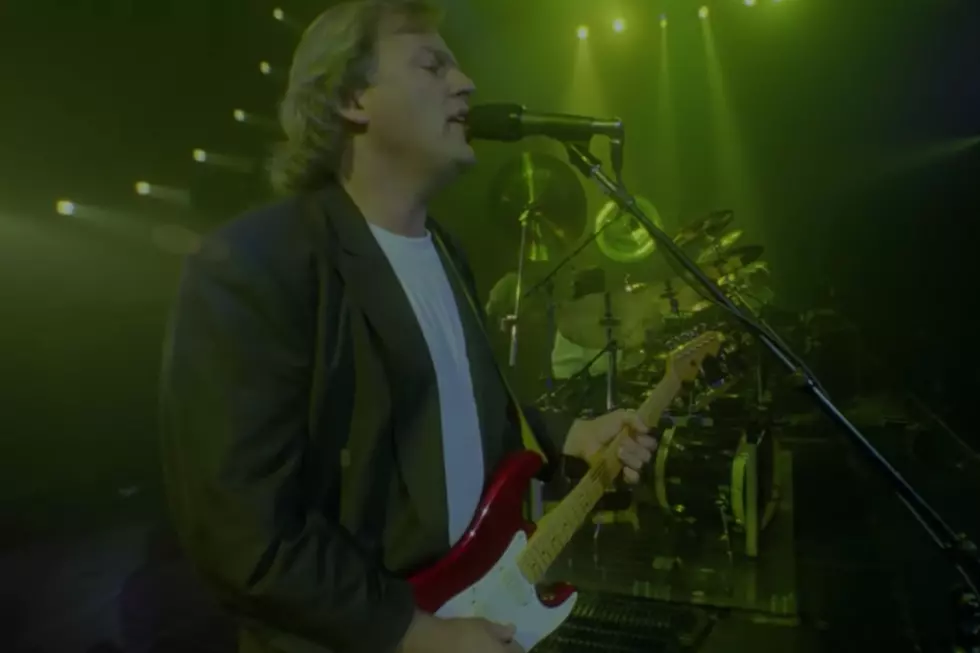
When Pink Floyd Re-Emerged With ‘A Momentary Lapse of Reason’
Despite reports of their demise, Pink Floyd returned with a new album on Sept. 7, 1987. A Momentary Lapse of Reason would make or break their future prospects without the departed Roger Waters.
They split after 1983's The Final Cut, with each member venturing out to do their own projects. Understanding that solo ventures would be a less lucrative proposition, their label continued to push for a reunion. David Gilmour started to waver in 1985 as he began to put a band together for his third solo release.
Waters had declared Pink Floyd "a spent force," but Gilmour saw the potential in moving forward. Keyboardist Richard Wright's wife contacted Gilmour about lending a hand musically, but his full return was stalled by legal matters relating to his ouster during sessions for The Wall. Nick Mason expressed interest in new music, however, and by 1986, Gilmour was reshaping some solo material for what would become the 13th Pink Floyd studio album.
Upset by their decision to move forward without him, Waters took the rest of the band to court over use of the name and attempted to thwart the release of A Momentary Lapse of Reason. But Gilmour refused to back down: "Roger is a dog in the manger and I'm going to fight him," Gilmour told the Sunday Times, as chronicled in the book A Saucerful of Secrets. "No one else has claimed Pink Floyd was entirely them. Anybody who does is extremely arrogant."
A bitter legal fight played out during the creation of the album and followed after A Momentary Lapse of Reason arrived in stores. Waters eventually relented, and a deal was struck where the band members could use the name so long as Waters could have the rights to The Wall.
The sessions provided their own challenges. Gilmour started recording A Momentary Lapse of Reason aboard his houseboat, the Astoria. Late-night calls from attorneys began to interfere, however, and the decision was made to move production to the U.S. That cleared up some of the time-zone issues on the legal side, while allowing Pink Floyd to be closer to producer Bob Ezrin.
Moving forward without Waters also proved difficult creatively. Gilmour decided against attempting the band's typical concept record, focusing instead on finding the best collection of songs. They likewise struggled with musical cohesion after so long away. Contributions were made by Mason and, to a lesser degree, Wright but sessions musicians were ultimately brought in to supplement the sound.
"You can't go back," Gilmour said in A Saucerful of Secrets. "You have to find a new way of working, of operating and getting on with it. We didn't make this remotely like we've made any other Floyd record. It was different systems, everything."
Watch Pink Floyd's Video for 'Learning to Fly'
Whatever their struggles, "Learning to Fly" quickly found an audience as the album's lead single. Gilmour and Mason had both been taking flying lessons, and Gilmour penned the track specifically about the feelings of freedom that flight gave him. Gilmour later purchased a De Havilland Devon airplane with Mason, whose voice was heard in the middle portion of this song via a cockpit recording.
While work continued on "Learning to Fly," Gilmour said he came to realize a new lyrical subtext, as he assumed the band's leadership role following Waters' departure.
"On the Turning Away," a more solemn piece referencing the issues of poverty and oppression, emerged as the second single. It fit well with the more ethereal songs in their catalog like "Us and Them" and "Wish You Were Here." The third and final single was "One Slip," a collaboration with Phil Manzanera that began a lengthy musical relationship between Gilmour and the Roxy Music guitarist. In a nod to the past, the blips and beeps at the beginning mirrored Pink Floyd's approach to "Money" from more than a decade earlier.
"Dogs of War," a trudging track about political mercenaries, emerged as a favorite live cut. The session was buoyed by a sound that came about by mistake. A slowed down recording of Gilmour's laugh came across like a dog bark, and he decided to use it in the song.
Still, A Momentary Lapse of Reason remains one of the band's most polarizing releases. Beyond a few standout tracks, the album as a whole didn't stand up to earlier triumphs. Waters stated flatly that it was not a true Pink Floyd release. "Roger's criticisms are fair," Wright agreed in the book Comfortably Numb: The Inside Story of Pink Floyd. "It's not a band album at all."
It all seemed to matter little to fans. A Momentary Lapse of Reason surpassed quadruple platinum status in the U.S, spawning the year's biggest tour and a companion live album, 1988's The Delicate Sound of Thunder. Then the crew of the Soyuz TM-7 took A Momentary Lapse of Reason on their mission, making Pink Floyd the first rock band to be played in outer space.
Top 50 Progressive Rock Albums
Why Pink Floyd’s David Gilmour and Roger Waters Are Still Fighting
More From Ultimate Classic Rock









